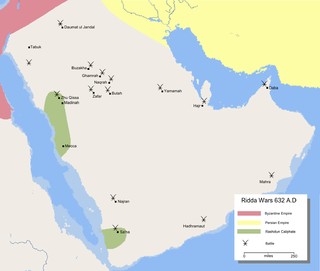
Najd is the central region of Saudi Arabia, in which about a third of the country's modern population resides. It is the home of the House of Saud, from which it pursued unification with Hejaz since the time of the Emirate of Diriyah.

Hadhramaut is a geographic region in southern Arabia, comprising mainly of the eastern Governorates of Yemen, the Dhofar Governorate in south-western Oman and the Najran Province in southern Saudi Arabia. The name is of ancient origin, and is retained in the name of the Yemeni Governorate of Hadhramaut. The people of Hadhramaut are called Hadharem. They formerly spoke Hadramautic, an old South Arabian language, but they now predominantly speak Hadhrami Arabic.

Yemen, a country on the Arabian Peninsula, holds a prominent position in the realm of music, garnering recognition for its distinctive musical traditions. Revered as a cultural capital within the Arab world, Yemen has contributed significantly to the musical landscape of the region.
Haidar Abu Bakr al-Attas is a Yemeni politician. He was appointed Prime Minister of Yemen by President Ali Abdullah Saleh when the People's Democratic Republic of Yemen and Yemen Arab Republic united in 1990 to form present-day Yemen. Al-Attas served until 1994. He is a member of the Yemeni Socialist Party.
Sabah al-Din Abu Qaws, also known as Sabah Fakhri, was a Syrian tenor singer from Aleppo.

The Ridda Wars were a series of military campaigns launched by the first caliph Abu Bakr against rebellious Arabian tribes, some of which were led by rival prophet claimants. They began shortly after the death of the Islamic prophet Muhammad in 632 and concluded the next year, with all battles won by the Rashidun Caliphate.

Mehad Hamad Mehad, is an Emirati artist and singer.
Khaliji music is the music of Eastern Arabia, the Arab states of the Persian Gulf and it is popular across the Arab world. It is traditionally characterized by heavy use of the rebab, oud and other string instruments such as the violin, the occasional use of habbān, and the inclusion of percussion instruments such as the mirwas, tabl, and duff drums. Khaliji music first started as a bedouin tradition with poetry sung by a tribe's shaa'ir, which means poet, usually accompanied by a rebab, the lyrics dealt with tales of honor, love, camel riders, and glory warriors.

Thekra bint Mohammed Al Dali, better known as Thekra, was a Tunisian singer.

Talal Maddah was a Saudi Arabian musician and composer. He was named Maddah after his mother's family. Commonly nicknamed as "The Earth's Voice". He had a substantial influence over 20th century-Arabian culture.
Abu Bakr al-ʿAydarūs, also known as Sayyid Abū Bakr al-ʿAdanī ibn ʿAbd Allāh al-ʿAydarūs was a Hadhrami religious scholar of Sufism and a poet who wrote in vernacular style. Abu Bakr spent most of his adult life in Aden, where he was well respected for his societal contributions to the well-being of the city's residents. After his death in 1508, he was mourned by the city's residents, and was later venerated as the wali or "patron saint" of Aden.
Ali al-Uraydi ibn Ja'far al-Sadiq, better known simply as Ali al-Uraydi, was the son of Ja'far al-Sadiq and the brother of Isma'il, Musa al-Kazim, Abdullah al-Aftah, and Muhammad Al-Dibaj. He was known by the title al-Uraydi, because he lived in an area called Urayd, about 4 miles from Medina. He was also known by the nickname Abu al-Hasan.

Alwi bin Thahir al-Haddad was an Islamic scholar known as the Mufti of Johor in twentieth century and also the co-founder of Jamiat Kheir and Al-Rabithah al-Alawiyyah foundations in Batavia during colonial Dutch East Indies.

Al-Muhdar Mosque or Al-Mihdar Mosque is one of the historical mosques in the ancient city of Tarim, in the Yemeni province of Hadramaut. It is attributed to Omar Al-Mihdar bin Abdul-Rahman Al-Saqqaf, a Muslim leader who lived in the city during the 15th-century.

Tarim is a historic town situated in Wadi Hadhramaut, Yemen. It is widely acknowledged as the theological, juridical, and academic center of the Hadhramaut Valley. An important center of Islamic learning, it is estimated to contain the highest concentration of descendants of the Islamic Prophet Muhammad known as the Sadah anywhere in the world. The city is distinguished for producing numerous Islamic scholars, including Imam al-Haddad. Additionally, Tarim is also home to Dar al-Mustafa, a well-known educational institution for the study of traditional Islamic Sciences.

Mohammed Abdo Arena, officially as the Artist of the Arabs Mohammed Abdu Stage, is a 22,000 seat multipurpose arena in the Hittin neighborhood of Riyadh, Saudi Arabia, located in the 'Theaters' area of Boulevard Riyadh City recreational complex.
Karama Mursal was a Yemeni singer born in Al-Mukalla, the capital of Hadhramaut Governorate, located in southeastern Yemen. He began his artistic career in the 1960s, precisely in 1963, at the age of seventeen, singing the works of many Hadhrami poets, notably the Hadhrami poet Hussein Abu Bakr Al-Mihdhar, who played a significant role in the success of his songs. He also sang poems by Omar Abu Bakr Al-Aidarus, Ahmed Salim Al-Bayd, Ahmed Salim Bamatraf, Jam'an Bamatraf, Junaid Bawazeer, and Abbas Al-Dilmi.













